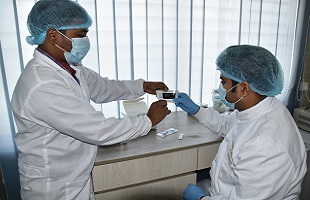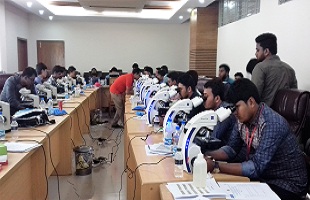The monsoon season is almost at hand in Cox’s Bazar, Bangladesh where more than 1.3 million people including Rohingya refugees and their host community remain heavily reliant on external assistance.
The rains will bring landslides and floods. Cyclones can worsen the situation at any time; especially at the end of the monsoon season. It will increase the vulnerability of the people to waterborne diseases such as diarrhea and hepatitis A and E, and vector borne diseases such as malaria and dengue.
As such, efforts have been made by the Government of Bangladesh with support from the World Health Organization and other partners to ensure the continuous availability of health services to the population during the monsoon season.
Key among these efforts are the prepositioning of medical supplies and equipment to more secure storage areas, equipping secondary level health facilities to handle referrals, as well as refresher trainings for health workers on disease prevention and treatment.

On 21 April, WHO conducted a hands-on-training on the laboratory diagnosis of malaria by rapid diagnostics and microscopy. This was held in collaboration with the National Malaria Elimination Program, Bangladesh. During the opening of the training, Dr Forhad Hossain, Acting Principal of the Cox’s Medical College said malaria has resurfaced as one the deadliest diseases in the country: “We have realized lately that malaria which was once put under control by the Government of Bangladesh with support from its partners is now reemerging.

“The training of the laboratory technicians who have come from the various health facilities across Cox’s Bazar is designed to intensify our actions to roll back malaria,” Dr Hossain adds.
WHO Representative Dr Bardan Jung Rana was also present to witness the opening of the training workshop. “It is very important for you to acquire the skills that will allow you to quickly and proficiently diagnose the presence of malaria parasites in a patient. This will allow for instant treatment and subsequent prevention of death” Dr Rana said to the participants.
“We want to ensure that the Forcibly Displaced Myanmar Nationals and their host community are kept safe,” he said.

Since the Rohingya crisis started, important progress has been made by the Government of Bangladesh and partner agencies to provide health services, prevent diseases such as cholera and rapidly control outbreaks of measles and diphtheria.
WHO continues to lead and coordinate efforts of over 100 partners managing more than 270 health facilities – health posts, hospitals, treatment centers and mobile clinics – while also providing medicines and medical equipment, diagnostics, guidelines and trainings and building laboratory capacity.
